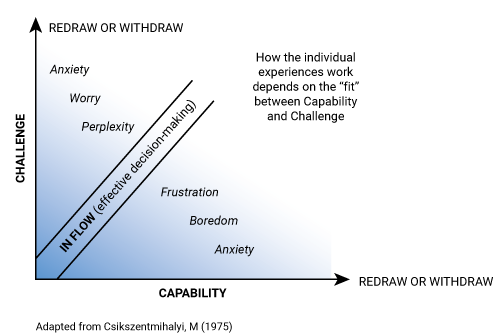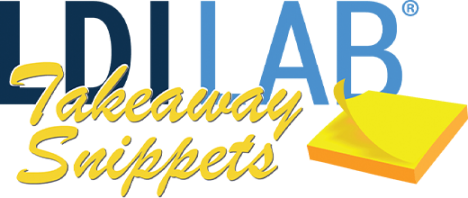
When Promotions Go Wrong: The Cautionary Tale of Carl and Maria
Why Performance ≠ Potential — and How to Keep Capability Aligned with Challenge
By Lisa Rios, MA Founder & CEO The LDI Group
At SteelCore Manufacturing, the leadership team believed they were rewarding top talent and setting the stage for growth. But what unfolded became a case study in what happens when promotions and job titles are misaligned with actual capability and challenge.
This is the story of Carl and Maria—and what their journeys reveal about the hidden dangers of the Peter Principle, Title Inflation, and overlooking the challenge-capability match.
Two Promotions, Two Problems
As SteelCore expanded operations, two major personnel changes were made:
- Carl, a high-performing Production Department Manager, was promoted to General Manager of the entire manufacturing division, now overseeing production, logistics, quality, and maintenance.
- Maria, an experienced Lean Six Sigma professional, was hired externally as Director of Operational Excellence, a title intended to signal strategic importance—though her role lacked a team, authority, or budget.
Within six months, both were struggling—and not for lack of talent.
Performance ≠ Potential
As highlighted in the Organization Design: Levels of Work & Human Capability: Executive Guide (Global Organization Design Society, 2007), performance in one role does not predict success in a more complex one. That’s because each level of work brings new challenges—from time horizons to decision complexity—that require new levels of capability.
The Challenge–Capability Chart

- Flow Zone: The sweet spot—where a person’s problem-solving capacity matches the complexity of the work.
- Overload: When the challenge exceeds the person’s capability—stress, stalled decisions, and missteps occur.
- Underload: When the role lacks challenge—people become disengaged, underused, or overreach their limits.
Carl: The Peter Principle in Action
Carl had been a rock star on the production floor—boosting output, reducing downtime, and creating a strong team culture. Leadership assumed that success meant readiness for more. They promoted him to General Manager of Manufacturing.
The Result? Carl was overwhelmed.
- He froze during critical vendor delays, waiting for perfect data—leading to a 36-hour production halt.
- He micromanaged production (his comfort zone) while ignoring systemic issues in logistics and maintenance.
- He avoided conflict, especially between procurement and operations, allowing costs to spiral.
Meanwhile, his promotion (with a 25% salary bump) caused discontent among veteran department heads, and his former second-in-command left the company after being passed over.
Carl had been promoted beyond his capacity. He landed in the overload zone—where the challenge of the role far exceeded his current capability. This was a classic case of the Peter Principle.
Maria: A Title Too Big, a Role Too Small
Maria’s resume was impressive. She brought deep process improvement expertise and a track record of leading change. But her new “Director” title was inflated—meant to attract talent without offering executive-level authority or resources.
The Result? Maria felt sidelined.
- She launched a company-wide KPI dashboard that was ignored—because she had no power to enforce it.
- She spotted a major cost-saving opportunity in changeovers but didn’t speak up, unsure if it was “her place.”
- Other directors, responsible for P&Ls and managing teams, quietly questioned her credibility and resented the title.
Maria’s role didn’t match her capability. She was placed in the underload zone, leading to lost impact and growing internal skepticism. This was Title Inflation in action—creating frustration through misalignment.
What SteelCore Learned
Carl and Maria’s situations sparked a turning point at SteelCore. Leadership began to evaluate how they structured roles, titles, and promotions.
Key Changes Implemented:
- Capability-Based Promotions
Promotions now require evaluation of future-role readiness—not just current-role success. - Title–Scope–Pay Alignment
No more inflated titles. Every role must match its responsibility, authority, and compensation band. - Challenge Mapping
Leaders now assess whether each role sits in the right zone—neither overwhelming nor underutilizing the person in it.
Where Are They Now?
Carl moved into a Director of Plant Operations role—back in the flow zone—where his technical strengths shine. He’s also receiving executive coaching to build long-range, cross-functional leadership skills.
Maria transitioned into leading a Process Improvement Office, with a small team, real authority, and a direct line to the COO. She’s finally in a position where her capabilities match the challenge.
Final Thought: Don’t Promote to Please—Promote to Match
People thrive when their capability aligns with the challenge of the role.
Misalign that, and even your best people will struggle.
Before your next promotion, ask yourself:
- Is this person prepared for the next level of complexity?
- Does the title reflect the actual authority, scope, and accountability?
- Will this role put them in the flow—or throw them into overload or underload?
Avoid the trap of confusing performance with potential. Keep your talent aligned, and your organization will move forward—without leaving your leaders behind.
Bring Clarity to Leadership & Role Complexity
Are your leaders equipped for the roles they’re in today—and prepared for the complexity of tomorrow? At The LDI Group, we help organizations assess leadership capability and role demands so you can make confident, data-driven talent and structure decisions.
With change-driven facilitation, industry-savvy insight, and agile tools for real-world shifts, we partner with you to:
- Identify capability gaps and role misalignments before they impact performance
- Build leadership strength to match organizational growth and complexity
- Equip your future leaders to lead with clarity, accountability, and resilience
Don’t leave leadership potential untapped or roles misaligned. Let’s create the clarity you need to unlock performance and prepare your organization for what’s next.
Contact us today:
- Don Mitchell – dmitchell@theldigroup.com
- growth@theldigroup.com
Visit: www.theldigroup.com
Direct: 951.756.3479 | Toll-Free: 888.480.7534

